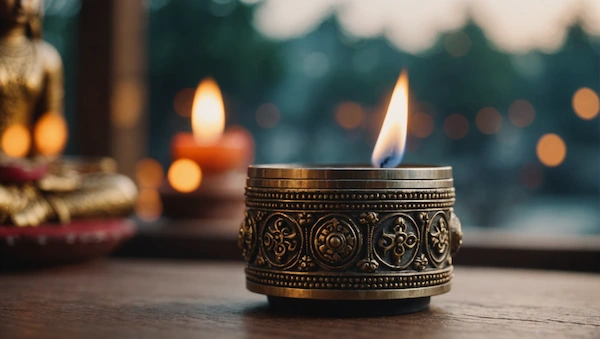
It is a common assumption that in order to be considered “spiritual”, one must adhere to a strict set of principles and practices. If the objective is to achieve ascension or enlightenment, it is clear that a high level of commitment and discipline is required.
However, what about those who are simply seeking a happier and more fulfilling life through spirituality? One might inquire whether the same degree of discipline should be applied. The value placed on discipline in our society is considerable; however, it is not clear whether this value is beneficial or detrimental. At what point does the application of discipline result in a net negative outcome?
It is a fallacious argument to suggest that one must adhere to a vegetarian diet in order to pursue spiritual growth. It is unclear where the assertion that one can only listen to relaxing music if one is spiritual is documented. A few weeks ago, I was informed by an acquaintance that they are currently abstaining from all forms of sugar due to their newly adopted spiritual beliefs. I inquired as to the rationale behind the zero-sugar intake, given the individual’s spiritual pursuits. The response I received was somewhat perplexing, as though I had not asked a reasonable question. I did not receive a response, as the individual turned away to engage in a conversation with another person, thereby terminating the interaction.
During the same week, I took part in a group meditation session on the topic of “indulgences”. In the meditation, participants were instructed to identify an indulgence they engage in. As one might expect, a plethora of potential indulgences came to mind, including reading a good novel, eating a bag of chips, drinking a glass of wine, enjoying a cup of coffee, and consuming chocolate. The list is quite extensive. The mere recollection of this experience elicited a smile. It is the seemingly insignificant aspects of life that can evoke a profound sense of joy.
While I was engaged in the act of smiling and experiencing a general sense of well-being, the meditation underwent a notable transition. I was abruptly prompted to envision myself overindulging in my chosen “indulgence”. To illustrate, if chocolate is the chosen indulgence, the individual is encouraged to consume a substantial quantity of the item in question. At this juncture, I began to experience some difficulty in maintaining my focus during the meditation. I permit myself a number of indulgences on the basis that life should be enjoyed. Furthermore, I have found from personal experience that when I allow myself these indulgences and feel positive about them, I never feel the need to overindulge.
Ultimately, I opted to cease involvement in this specific meditation practice due to my preference not to engage in the visualization of excessive indulgence. It was not a practice that I found to be in alignment with my personal values and sensibilities. Nevertheless, a meditation of this nature may prove beneficial for those struggling with a genuine addiction, particularly if the individual is unable to cease their excessive consumption. The key term here is “over” indulging. There is a significant distinction between a life-enhancing indulgence and a harmful overindulgence.
It is crucial to comprehend that a perspective which deems all indulgences to be detrimental is an inherently imbalanced approach to spirituality.
It has become evident that there are those who believe that the restriction of pleasurable activities is a pathway to spiritual growth. This belief is a fundamental tenet of numerous religious traditions, which espouse the idea that discipline and suffering are prerequisites for attaining divine enlightenment.
It is my contention that self-denial or restriction does not enhance or diminish spiritual capacity, nor does it facilitate spiritual progress. It is my conviction that the purpose of our existence is to fully engage with the experiences of life, rather than to deliberately seek to diminish the joy that these experiences offer. This is particularly relevant when one has chosen to pursue an otherworldly path.
I adhere to the principle of maintaining equilibrium in all aspects of my life. To illustrate, on occasion I engage with heavy metal music. Initially, I was hesitant to divulge this aspect of my personal beliefs because I was aware that some individuals with spiritual inclinations might view this form of indulgence with disapproval. This is precisely why I have chosen to disseminate this particular piece of information. I am aware that I derive pleasure from this activity and, as a result, I am disinclined to disavow this aspect of my identity. I am sufficiently self-accepting and self-loving to acknowledge this indulgence and to embrace it as a positive aspect of my personality. Does this make me less spiritual? Such an assertion is demonstrably false. This merely distinguishes me as an individual who is capable of appreciating spirituality in all aspects of life.
Does the consumption of a good steak result in a loss of emotional stability and clarity of thought? Such a conclusion would be erroneous. However, I do acknowledge the cow as a source of gratitude. Does allowing anger or frustration to manifest in one’s demeanor render one less loving? Such a proposition is untenable. Humans are complex beings with a vast spectrum of emotions that should not be simplistically categorized as “good” or “bad”. One need not suppress the so-called “bad” emotions simply because they are not aligned with the conventional view of what it means to be a spiritual person. Regardless of how one lives one’s life, at the core, we are all celestial beings.
Those who do not pursue enlightenment may still benefit from a balanced approach to their otherworldly journey. One should refrain from self-criticism merely due to the consumption of two cookies instead of one, or the enjoyment of a glass of wine. One’s spiritual orientation is not diminished by an inclination towards activities such as dancing in a nightclub or reading a good thriller.
In my own conduct, I endeavor to adhere to two fundamental principles, which I consider to be of paramount importance:
1. Do no harm to any individual.
2. It is my intention to disseminate benevolence and illumination wherever I may go. All other aspects of life are open to debate and available for personal experience. The decision is mine, or yours, to make.
In the context of spiritual practice, it is important to maintain a balance between introspection and enjoyment. While it is essential to engage in practices that align with one’s spiritual beliefs, it is also crucial to embrace activities that bring joy and fulfillment. One might posit that the concept of spirituality is not constrained by the limitations that are commonly ascribed to it. One must refrain from making judgments. Such actions do not facilitate one’s highest level of personal growth and development. Maintaining equilibrium is an optimal approach to existence.
ARE YOU APOLLONIAN OR DIONYSIAN?
Have you ever heard of the Apollonian and Dionysian concepts? They were developed by Friedrich Nietzsche and represent two opposing principles that influenced the art and culture of ancient Greece. The Apollonian spirit is all about order, rationality, and ideal beauty. The Dionysian spirit, on the other hand, is about embracing chaos, following your instincts, and enjoying the intoxicating joy of life. Both of these principles are ways of responding to the pain of living. The Dionysian deals with pain through intoxication, celebrating life, and enjoying sensory pleasure. The Apollonian, on the other hand, seeks to find meaning and purpose in this suffering through rational reflection, art, and sublimation. Which mode of existence resonates with you the most?
Instructions:
Select only one answer for each question (A or D).
Answer all questions, 5 in total.
1. Life is wonderful, you just have to learn how to enjoy it!
2. Business before pleasure. Are you really sure about this?
3. Do you easily get carried away by feelings and emotions?
4. An unexpected economic opportunity arises. How do you react?
5. What kind of relationship do you have with order and discipline?
Count the number of responses for each type, A and D, then refer to the corresponding profile.
A=5 / D=0: You are a direct descendant of Apollo!
A=4 / D=1: You are strongly Apollonian
A=3 / D=2: You are Apollonian with Dionysian tendencies
A=2 / D=3: You are Dionysian but without excess
A=1 / D=4: You are a Dionysus wannabe!
A=0 / D=5: You are Dionysus himself!
Further details on being Apollonian or Dionysian
📚 Academic Bibliography
🏛️ Classical Philosophical Foundations
Nietzsche, Friedrich. The Birth of Tragedy: Out of the Spirit of Music. Translated by Walter Kaufmann. Vintage Books, 1967. [Originally published 1872]
Aristotle. Nicomachean Ethics. Translated by Terence Irwin. Hackett Publishing, 1999. Book II: The Doctrine of the Mean.
Epicurus. The Essential Epicurus: Letters, Principal Doctrines, Vatican Sayings, and Fragments. Translated by Eugene O’Connor. Prometheus Books, 1993.
Augustine, Saint. Confessions. Translated by R.S. Pine-Coffin. Penguin Classics, 1961. Book VIII: On the Nature of Temptation and Spiritual Struggle.
Aquinas, Thomas. Summa Theologica. Translated by Fathers of the English Dominican Province. Benziger Brothers, 1947. Questions on Temperance and Moderation.
🧘 Eastern Philosophy and Spirituality
Buddha. The Middle Way: The Buddha’s Practical Teaching. Translated by David J. Kalupahana. SUNY Press, 1991.
Lao Tzu. Tao Te Ching. Translated by Stephen Mitchell. Harper Perennial Modern Classics, 2006.
Yogananda, Paramahansa. The Science of Enlightenment. Self-Realization Fellowship, 2008. Chapters on Balanced Living and Spiritual Discipline.
Suzuki, D.T. Zen and Japanese Culture. Princeton University Press, 1973.
Watts, Alan. The Way of Zen. Vintage Books, 1999. Sections on Non-Attachment and Natural Living.
Krishnamurti, Jiddu. Freedom from the Known. HarperOne, 2009. Discussions on Choice-less Awareness and Natural Response.
🔬 Contemporary Psychology and Spiritual Development
Maslow, Abraham. Toward a Psychology of Being. 3rd edition. Wiley, 1999. Chapters on Self-Actualization and Peak Experiences.
Jung, Carl Gustav. Modern Man in Search of a Soul. Translated by W.S. Dell and Cary F. Baynes. Harcourt, 1933.
Wilber, Ken. Integral Spirituality: A Startling New Role for Religion in the Modern and Postmodern World. Integral Books, 2007.
Peck, M. Scott. The Road Less Traveled: A New Psychology of Love, Traditional Values and Spiritual Growth. Touchstone, 2003.
Kornfield, Jack. After the Ecstasy, the Laundry: How the Heart Grows Wise on the Spiritual Path. Bantam, 2001.
Moore, Thomas. Care of the Soul: A Guide for Cultivating Depth and Sacredness in Everyday Life. HarperPerennial, 1994.
📖 Scholarly Articles on Spiritual Balance and Moderation
Emmons, Robert A. “The Psychology of Ultimate Concerns: Motivation and Spirituality in Personality Development.” Journal of Personality, vol. 67, no. 6, 1999, pp. 967-1002.
Hill, Peter C., and Kenneth I. Pargament. “Advances in the Conceptualization and Measurement of Religion and Spirituality.” American Psychologist, vol. 58, no. 1, 2003, pp. 64-74.
Miller, William R., and Carl E. Thoresen. “Spirituality, Religion, and Health: An Emerging Research Field.” American Psychologist, vol. 58, no. 1, 2003, pp. 24-35.
Piedmont, Ralph L. “Does Spirituality Represent the Sixth Factor of Personality? Spiritual Transcendence and the Five-Factor Model.” Journal of Personality, vol. 67, no. 6, 1999, pp. 985-1013.
Seybold, Kevin S., and Peter C. Hill. “The Role of Religion and Spirituality in Mental and Physical Health.” Current Directions in Psychological Science, vol. 10, no. 1, 2001, pp. 21-24.
🌟 Mystical and Contemplative Traditions
Meister Eckhart. The Essential Sermons, Commentaries, Treatises, and Defense. Translated by Edmund Colledge and Bernard McGinn. Paulist Press, 1981.
St. John of the Cross. Dark Night of the Soul. Translated by E. Allison Peers. Dover Publications, 2003. [Originally written c. 1579-1585]
Rumi, Jalal ad-Din. The Essential Rumi. Translated by Coleman Barks. HarperOne, 2004.
The Cloud of Unknowing. Translated by Carmen Acevedo Butcher. Shambhala Publications, 2009. [Anonymous 14th-century work]
Underhill, Evelyn. Mysticism: A Study in the Nature and Development of Spiritual Consciousness. Dover Publications, 2002.
🎭 Cultural and Anthropological Studies
Turner, Victor. The Ritual Process: Structure and Anti-Structure. University of Chicago Press, 1995.
Eliade, Mircea. The Sacred and the Profane: The Nature of Religion. Translated by Willard R. Trask. Harcourt, 1987.
Campbell, Joseph. The Hero with a Thousand Faces. 3rd edition. New World Library, 2008.
Otto, Rudolf. The Idea of the Holy. Translated by John W. Harvey. Oxford University Press, 1958.
Geertz, Clifford. The Interpretation of Cultures. Basic Books, 1973. Essays on Religion and Meaning.
🧠 Neuroscience and Consciousness Studies
Austin, James H. Zen and the Brain: Toward an Understanding of Meditation and Consciousness. MIT Press, 1998.
Newberg, Andrew, and Mark Robert Waldman. How God Changes Your Brain: Breakthrough Findings from a Leading Neuroscientist. Ballantine Books, 2009.
Davidson, Richard J., and Antoine Lutz. “Buddha’s Brain: Neuroplasticity and Meditation.” IEEE Signal Processing Magazine, vol. 25, no. 6, 2008, pp. 176-188.
Goleman, Daniel. Destructive Emotions: A Scientific Dialogue with the Dalai Lama. Bantam, 2004.
Varela, Francisco J., Evan Thompson, and Eleanor Rosch. The Embodied Mind: Cognitive Science and Human Experience. MIT Press, 1993.
📚 Contemporary Spiritual Literature
Tolle, Eckhart. The Power of Now: A Guide to Spiritual Enlightenment. New World Library, 2004.
Chopra, Deepak. The Seven Spiritual Laws of Success: A Practical Guide to the Fulfillment of Your Dreams. New World Library, 2007.
Palmer, Parker J. A Hidden Wholeness: The Journey Toward an Undivided Life. Jossey-Bass, 2004.
Hanh, Thich Nhat. The Heart of Understanding: Commentaries on the Prajnaparamita Heart Sutra. Parallax Press, 1988.
Ram Dass. Be Here Now. Crown Publishing, 1971.
⚖️ Ethical and Moral Philosophy
MacIntyre, Alasdair. After Virtue. 3rd edition. University of Notre Dame Press, 2007.
Taylor, Charles. Sources of the Self: The Making of the Modern Identity. Harvard University Press, 1992.
Murdoch, Iris. The Sovereignty of Good. Routledge, 2001.
Williams, Bernard. Ethics and the Limits of Philosophy. Harvard University Press, 1985.
Nussbaum, Martha C. The Therapy of Desire: Theory and Practice in Hellenistic Ethics. Princeton University Press, 1994.
🔮 Transpersonal and Integral Studies
Grof, Stanislav. The Adventure of Self-Discovery: Dimensions of Consciousness and New Perspectives in Psychotherapy and Inner Exploration. SUNY Press, 1988.
Washburn, Michael. Transpersonal Psychology in Psychoanalytic Perspective. SUNY Press, 1994.
Wade, Jenny. Changes of Mind: A Holonomic Theory of the Evolution of Consciousness. SUNY Press, 1996.
Ferrer, Jorge N. Revisioning Transpersonal Theory: A Participatory Vision of Human Spirituality. SUNY Press, 2002.
Beck, Don Edward, and Chris C. Cowan. Spiral Dynamics: Mastering Values, Leadership and Change. Blackwell Publishers, 1996.
🛠️ Methodological Notes
Theoretical Framework: This analysis employs an interdisciplinary approach drawing from moral philosophy, transpersonal psychology, comparative mysticism, and cultural anthropology to examine the integration of spiritual practice with worldly enjoyment.
Source Evaluation: Primary emphasis placed on peer-reviewed academic sources, canonical philosophical texts, and established works in consciousness studies and religious studies. Special attention given to works that address the false dichotomy between spiritual development and life enjoyment.
Cultural Context: The analysis situates contemporary spiritual seeking within the broader context of postmodern spirituality, individualistic religious expression, and the integration of Eastern and Western philosophical traditions.
Psychological Framework: Cross-referencing of developmental psychology models, particularly those addressing stages of moral and spiritual development, with emphasis on balanced approaches to human flourishing and authentic self-expression.





